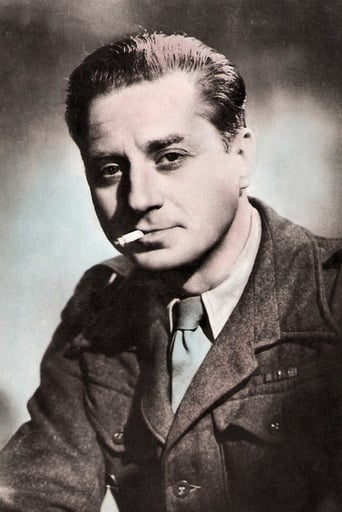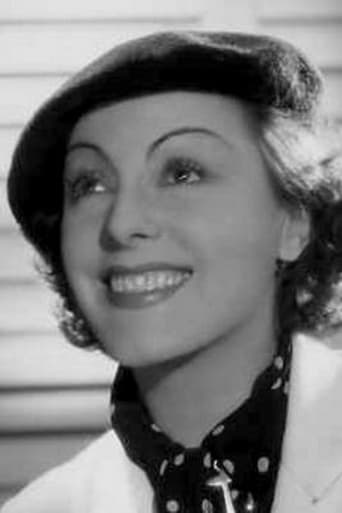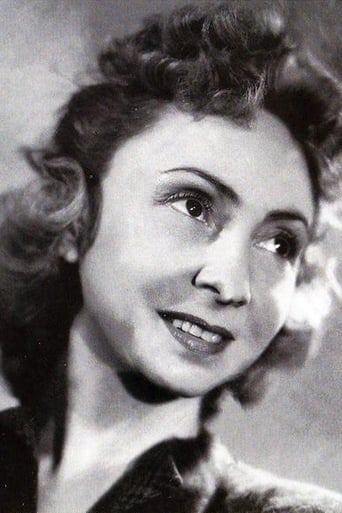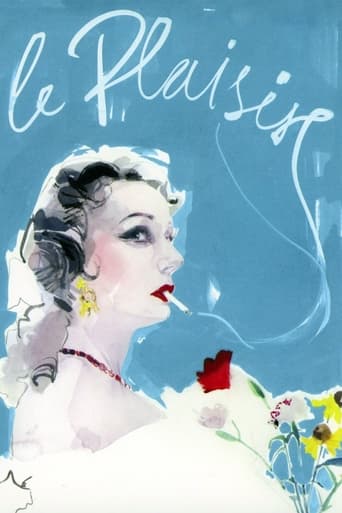
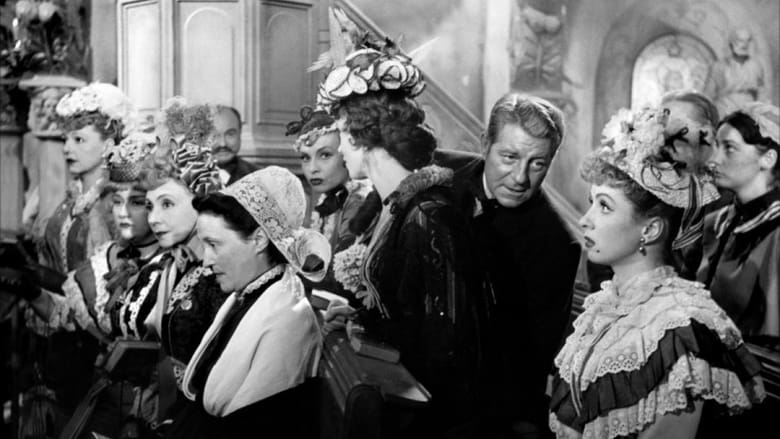
Le Plaisir (1952)
Three stories about the pleasure. The first one is about a man hiding his age behind a mask to keep going to balls and fancying women - pleasure and youth. Then comes the long tale of Mme Tellier taking her girls (whores) to the country for attending her niece's communion - pleasure and purity. And lastly, Jean the painter falling in love with his model - pleasure and death.
Watch Trailer
Cast


Reviews
There is a certain mood that I am subject to which can be satisfied only by a sunny, quiet, late Sunday afternoon on the couch with Maupassant. (I suspect that Proust would do even better but I lack the stamina.) My wife and I discovered Ophuls by watching The Earings of Madame de... on instant Netflix. When I saw that Le plaisir was Maupassant my heart leaped and, after viewing it, I can now report that the film is as exquisite as the stories themselves (minus the soft Sunday afternoons, of course).The film contains three stories each of which depict an aspect of pleasure: the pleasure of youth, the pleasure of innocence and the pleasure of fate.The second tale, La maison Tellier ('Madame Tellier's Establishment' in my translated collection of Maupassant stories) is the centerpiece of the film. It describes a trip to a small country village by a madame and her platoon of lovable ladies in order to attend the first communion of her nephew where pleasure meets innocence. The scene in the church where Rosa, overcome with memories of her lost innocence, starts to weep and then everyone in the church is soon weeping, is one of the most poignant I have ever seen on film. It is a depiction not only of the seriousness of lost innocence but it's universality as well and serves to show Rosa's sins, on display for all to see, joined in one spontaneous flood of remorse and gratitude by the hidden sins of all the respectable village folk. See if you don't fall into tears as well.If you have not read Maupassant, doing so before viewing the film will heighten your enjoyment. For those who have decided to view the four major Ophuls films, I offer the opinion that this is the best of them and would be a good place to start.Social Commentary: Never having visited France, I cannot say whether the charming French idea of innocent naughtiness has given that country a better life. But if the concept of 'a little sin is the spice of life' adds something to the life of the well off (and I doubt it), it certainly does not work for the poor. Drive through any blighted urban neighborhood for the proof. So-called rigid bourgeois values may not make for good stories or movies but they are essential for those who have it in mind that their children do well in school and go on to live decent lives. Enjoy these stories and, yes, acknowledge the hypocrisy of middle class morality, but do not transplant la belle vie into your own family or you will live to regret it.
One of the best films I've seen this year. I've had a sketchy past with director Ophuls up to now. The only film of his that I had previously seen and liked was Liebelei, though I don't remember it well. I found La Ronde slight, and I found The Earrings of Madame de... detestable (I recall the former, which I saw about a decade ago, well enough, but don't recall the latter, which I've seen much more recently, whatsoever). Both are now on my revisit list after Le Plaisir. I can't believe I could miss this in those other two, more famous films, but Le Plaisir reveals Ophuls to be one of the great masters of cinematic invention. His shots are incredibly impressive. They look so effortless, but probably required hundreds of hours of planning. The sets are unbelievably complex. There are three stories in the film, all by Guy de Maupassant. The central story comprises probably two thirds or more of the film's running time. It is about a group of prostitutes who abandon their whorehouse on a busy Saturday night to visit the Madame's brother's family, as her niece and nephew are to be Christened on Sunday morning. The first half of this tale has to do with the enormous group of men who find the house empty and don't know what to do with themselves. The rest of it is about the women's bucolic one day vacation. The first story is a short one about an old man who wears a mask to disguise his age. In an amazing single shot, he enters a rocking ball and parties his butt off until he faints. The doctor takes him home and his wife tells him the old man's story. The final story is about the tumultuous love affair between an artist and his model (Simone Simon, the most beautiful woman to have ever lived, I think). This story is pure energy, with the couple falling in love in the course of a single take and off camera (!). Things start to go afoul, and there's this outrageously great sequence where Simon locks the artist indoors and he searches madly for the key. The two end up smashing everything in the house in what has to be one of the most emotionally draining fights in film history, and with very few actual words. All three of the tales are simple, but somehow deeply affecting. My only real complaint has to do with the picture quality of the Criterion DVD, which seems below their normal standard. The film itself is a masterpiece, or pretty close, anyway.
A trilogy of Guy de Maupassant stories, two short simple ones framing a long and impossibly rich one, and I don't know why everyone complains about the framing ones - everything is given exactly the weight that their narrative will support. An old man dressing up like a young dandy to relive the gavotting excesses of his youth, only to end in physical collapse, starts things off; and to close we have a beautiful young couple who go from romantic bliss to petty vindictiveness to resigned acceptance via an attempted suicide. This gives us a rather complex understanding of the meaning of 'pleasure', and the worst you can say is that one and three don't utterly embody pleasure the way number two does (although the swirling camera work in the dance scene comes damn close). The story of a troop of sex workers romping off to a country wedding is simplicity itself, but also incredibly rich - full of memorable human beings and interactions. Everyone sees happiness in the place that they're not, but this episode celebrates life wherever it finds it, and it's a joy to watch.
Happiness, says the narrator at the end, is not a lark. And the film believes it, even though as he speaks the glimpses of children playing with kites and daintily placed chairs on the beach (echoing those set out earlier by Gabin in the back of his cart for the visiting prostitutes) continue to evoke the swirling compositional grace and elegance which mark the film's every moment. Far more unpredictable and radical than most portmanteau films, the highlight is the second story, which at first seems to be about a group of men who get together one night when the local brothel is closed, then follows the whores' trip to the country (with a delightful interlude on the train as they share the compartment with an old peasant couple and a randy salesman); then returns to the brothel - Ophuls' highly liberal camera ultimately pans deliriously around the windows from the outside as the place fills with dance, spilling celebration and delight. The many surprises of that story perfectly evoke the enormous span of human emotional experience; it touches on so many dreams of escape whereas the other two episodes, both much shorter and darker, remind us of the occasional price of such dreams.


